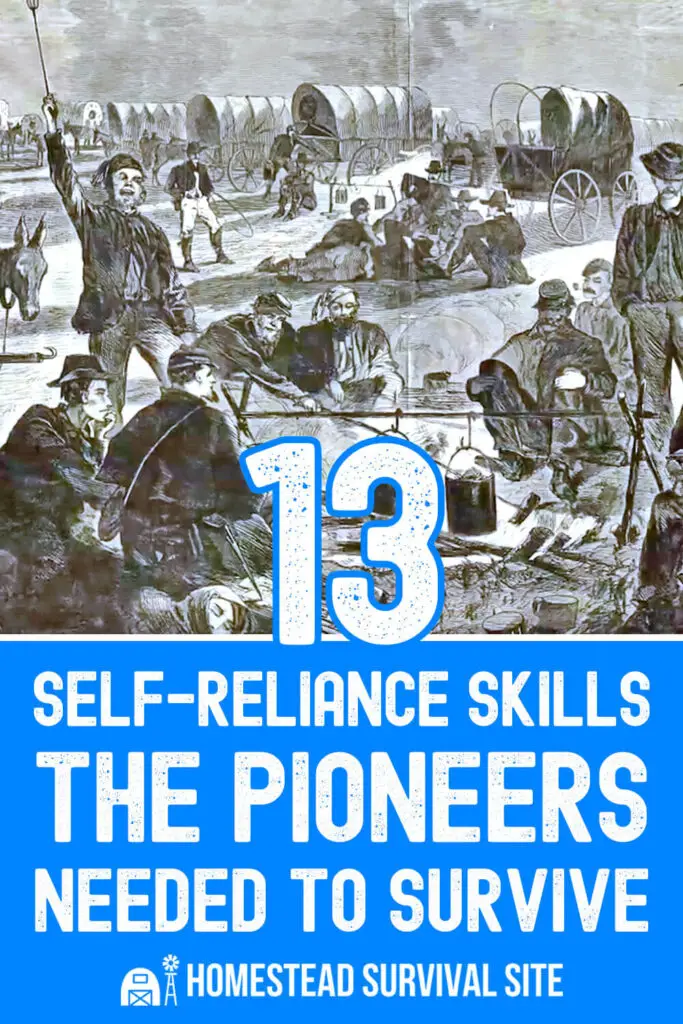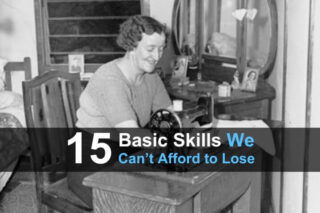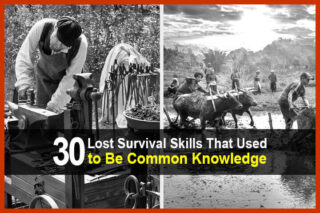Estimated reading time: 6 minutes
Between 1840 and 1860, more than 400,000 men, women, and children set out on the overland journey across the American West which became known as the Oregon Trail. Heading out from departure points in Missouri, these pioneers desired a new life, one that offered more freedom, more opportunity, and more space.
In some ways, these Americans are not so different in spirit than modern homesteaders. However, 19th-century pioneers had to be prepared to face many hazards – among them were outbreaks of disease, dangerous river crossings, arid deserts, and possible attacks by Native Americans.
In order to survive both the arduous journey and the rugged way of life when they reached journey’s end, American pioneers needed to be self-reliant. They learned – sometimes in advance and other times by way of the school of hard knocks – many skills that we can benefit from today.
Here, in no particular order, are a baker’s dozen of self-reliance skills the pioneers had to have to survive the journey out West.
Want to save this post for later? Click Here to Pin It On Pinterest!
1. Finding Food
The abilities to hunt, to trap, and to forage for food are essential survival skills. Many modern homesteaders might focus on learning one of these, but successful pioneers knew how to do all three.
Survival can come down to knowing how to find edible plants in the wilderness and being able to trap or hunt animals for meat. Fishing is another tangible skill that pioneers knew how to do or learned to do on their journey West.
2. Tracking
To help them find animals they could use for food, clothing, and tools, the pioneers also developed tracking skills. They could identify footprints and places where animals had been living or resting. They learned to be alert to smells and sounds that could signal both danger and opportunity when it came to wild animals.
3. Butchering
Hunting and trapping are useless unless you know what to do with the animal after you've killed it. Not only is it dangerous to eat meat that has not been properly butchered, but it can be wasteful as well.
Pioneers learned to butcher an animal so that all parts could be used. In addition to the meat, every part had a use, including the skin for leather clothing and shoes, bladders for pouches, fat for cooking and candle making, and bones for tools.
4. Finding Water
Water is essential to life. Pioneers became adept at finding water in the wilderness and in digging wells when they established a homestead. They also conserved water and captured rainwater for their gardens and animals.
5. Navigating
In order to find food and water without getting lost, pioneers needed tracking skills. Today, many of us rely on technology to help us find our way, but technology is fallible, and GPS can be useless in the wilderness. Pioneers learned to navigate through the use of compasses and by knowing the patterns of the sun and the stars in the sky.
6. Building a Shelter
Basic carpentry skills were a must on the frontier. Pioneers knew how to fell trees and how to build temporary shelters with limited tools and supplies. They had quality, durable tools to help them build.
7. Starting a Fire
Can you start a fire without the aid of matches or a lighter? This skill was essential for the pioneer, and it is one every homesteader should learn and practice for use in an emergency.
8. Cooking Over An Open Fire
After you have started that fire, it can do more than just offer warmth. In a survival situation, you may need to use it to cook your food. Do you know how to cook over an open fire? Cooking with a heavy cast iron pot (or Dutch oven) is a traditional skill worth learning.
9. Preserving Food
On the frontier, it was often a life of feast or famine, so the pioneers learned how to make things last. They became adept at storing and preserving food – all without modern means of cooking and refrigeration.
Today, we can learn from their example by learning how to can, freeze-dry, and smoke our food for long-term storage.
10. Healing
When illness or disease hit, the pioneers had to rely on themselves and their knowledge of natural medicine. Successful pioneers knew and practiced ancient healing arts using herbs, berries, and roots to make tonics, salves, poultices, tinctures, plasters, and teas. Modern research has proven the effectiveness of many of these traditional methods, and they are of no less use today.
11. Making What You Need
In modern society, we have become so accustomed to buying whatever we need. Pioneers did not have this luxury, however, so they learned how to make most of their necessities. They sewed, knitted, and wove their own clothing. They made their own soap and candles. They crafted their own tools.
Not only will you save money by making some of your own household supplies, you will find it surprisingly satisfying.
12. Trading
Today’s homesteaders would do well to brush up on the old-fashioned art of bartering. Pioneers frequently traded things they had in large supply or skills they were particularly good at for things and services they needed.
If you have an abundance of eggs, for instance, you might trade them for your neighbor’s wool. If another homesteader has building skills beyond yours, you can exchange their time helping you build a barn for smoking their meat along with yours.
Want to learn a new skill? In addition to trading what they had, pioneers often traded lessons with each other. If you are a weaver, you can trade weaving instruction for gardening lessons, for example.
13. Making Your Own Entertainment
Entertainment might not be essential for survival, but it is essential for sanity. Once again, we can look to pioneer families for inspiration.
In the days long before technology, pioneers used music and storytelling and other forms of art to help them pass the time in the evening and when they were not working.
You can learn these valuable arts and pass them down to your children. Here are a few ideas to get you started:
- Tell each other imaginative stories.
- Read aloud to each other.
- Learn now to play instruments and sing together.
- Work puzzles and brain games together.
- Draw, paint or work with clay.
- Learn needlepoint, knitting or other handiwork.
- Carve wood.
Sometimes it’s easy to forget that pioneers were regular people just like us. (Some of their friends and families back home probably thought they were nuts, too!) They set out on their journeys, seeking a better life just as homesteaders are doing today. Their challenges might have been more of a life and death variety than ours, but we can learn from their example.
Like this post? Don't Forget to Pin It On Pinterest!











I believe the problem with modern living is we get comfortable and forget how many people before us have done all this for us. we must remember the way because we’ll be completely lost if these things we are so used to or taken for granted suddenly disappear.
if an when the shit hits the fan it wont be good for most of the people the true outdoors man who hunt fish an trap will be the survival experts i hunt fish trap butcher clean everthing i harvest i smoke meat hunt with bow reload my own ammo im sure ill last longer than most